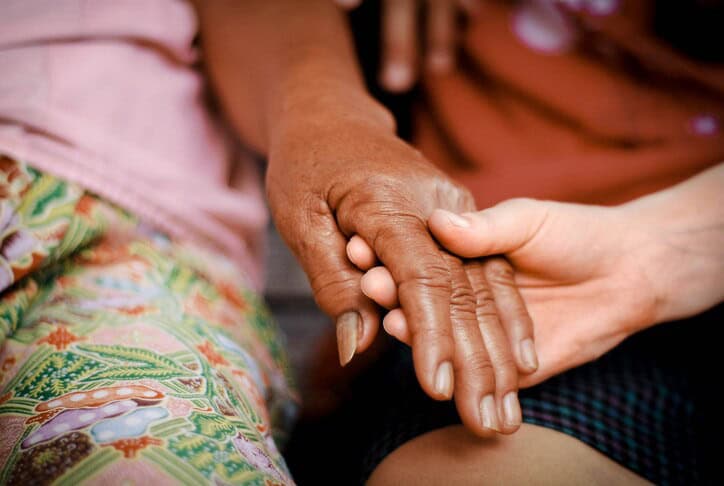Being an empath is a struggle, because it’s like carrying a secret world inside you – one that most people don’t see or understand.
While empaths are always praised for their kindness and deep understanding, they also face issues that are rarely talked about.
It’s not all love and light, and it can often feel more like a curse than a gift.
From overwhelming emotions to constant energy drain, empaths navigate a maze of hidden issues that can leave them exhausted or misunderstood.
Here’s a peek into the unspoken challenges only empaths really get.
1. Emotional Overload

Empaths absorb the emotions of everyone around them, often without even realizing it.
This means they can easily get overwhelmed by negative feelings – anger, sadness, anxiety – that aren’t even theirs!
Imagine walking into a room and feeling everyone’s stress and struggle like it’s your own. It’s exhausting trying to filter through all this emotional noise, and sometimes, it leads to burnout.
This constant emotional influx can make daily life feel like riding a rollercoaster with no brakes, leaving empaths drained and craving solitude.
2. The Curse of Deep Sensitivity

Being extremely sensitive is both a blessing and a curse. It means that empaths esperienza gioia and good feelings more intensamente, but it also makes them more vulnerable to hurt.
A harsh word or a critical glance can cut deeper than it would for others.
This heightened sensitivity often causes empaths to second-guess themselves or withdraw from situations to avoid getting hurt.
This struggle feels like walking a tightrope between feeling everything profoundly and protecting their fragile hearts from the world’s harshness.
3. Energy Vampires Everywhere

Empaths have a knack for picking up on other people’s energies, which can often be a double-edged sword.
Unfortunately, some people thrive on draining others – whether intentionally or not.
These energy vampires leave empaths emotionally and physically exhausted after interactions. It’s like they’re constantly running on an empty tank.
This struggle makes it hard for empaths to set boundaries, often leading to feelings of resentment or guilt for needing peace and solitude.
4. Feeling Isolated in a Crowded World

Despite being surrounded by people, empaths can often feel incredibly lonely.
Il loro intense emotional awareness can make it hard to deeply connect with others, who don’t understand their struggles.
Often, they struggle to hide their true feelings to avoid being seen as “too much” or misunderstood. This emotional distance creates a sense of isolation, even in social settings.
They long for genuine connection but fear rejection or being overwhelmed.
It’s a lonely paradox – surrounded by people yet feeling completely alone in their internal world.
5. Struggling With Boundaries

Empaths often struggle with saying no o protecting their energy. They genuinely want to help others, which can lead to overextending themselves.
Without clear boundaries, they become emotional punching bags, absorbing others’ problems without taking care of their own needs.
This constant giving can lead to resentment, burnout, and losing their sense of self.
Learning to say no feels almost impossible, and this lack of boundaries can damage their relationships and mental health over time.
6. The Weight of Empathy is Toxic Environments

Being empathetic in toxic surroundings is a huge struggle.
Whether it’s a toxic workplace, family drama, o unhealthy relationships, empaths can feel every ounce of negativity, which drags them down even more.
They often feel helpless, wanting to fix or heal what’s broken but realizing some situations can’t be changed.
This emotional burden can make them feel stuck, drained, and hopeless – further fueling their internal battles.
It’s a constant tug-of-war between caring deeply and protecting their own mental health.
7. Reliving Past Hurts

Empaths tend to remember emotional wounds longer and more vividly than others. Past hurts can haunt them for years, replaying in their mind during quiet moments.
This tendency to ruminate makes moving on difficult, leading to feelings of regret, guilt, o tristezza.
They often carry the weight of unresolved pain, which impacts their confidence and outlook on life.
It’s like having a mental replay button that’s constantly stuck on the worst moments, making healing a struggle, and a slow, painful process.
8. Difficulty in Finding True Peace

Inner peace can feel elusive for empaths. Their minds are busy analyzing feelings, situations, and relationships, making it hard to simply relax.
External chaos amplifies their stress, and they often seek solitude to recharge, but even that isn’t always enough.
The constant sensory input – from noise, crowds, and even bright lights – can leave them feeling overstimulated.
Achieving a calm, centered state is a continuous struggle, making relaxation and mindfulness feel like distant goals rather than everyday realities.
9. Identifying with Others’ Pain

Empaths naturally want to help, but sometimes this leads to overidentification with others’ suffering.
They feel so deeply that they can sometimes forget where their feelings end and someone else’s begin.
This can cause confusion, making it hard to distinguish their own needs from those of others.
Over time, it can lead to emotional exhaustion, guilt, or burnout. They might neglect their own well-being because they’re so focused on alleviating others’ pain.
And even though it shouldn’t, this ends up being their struggle.
10. The Struggle of Finding Balance

Balancing empathy with self-care is one of the biggest struggles for these people. They want to be there for others, but they also need to protect themselves.
Learning to set confini, to practice amore per se stessi, e ricarica is a continuous journey.
Without it, they risk losing themselves in the chaos of others’ emotions.
The issue lies in finding that sweet spot – being compassionate without sacrificing their own mental and emotional health.
It’s a delicate dance that takes patience, awareness, and a lot of self-compassion.
11. The Gift and the Curse of Empathy

Being an empath is a double-edged sword. The ability to understand and connect on a deep level is beautiful, but it can also be overwhelming.
The emotional weight empaths carry can feel like a burden, yet it’s part of what makes them so uniquely compassionate.
Recognizing these hidden struggles is key to self-acceptance.
When they learn to protect their energy and set boundaries, they can embrace this gift without feeling like it’s a curse in disguise.
It’s about learning to honor their sensitivity while nurturing their benessere.
A little Aquarius, devoted to writing and embroidery. Through my writing, I hope to empower readers to align with their true selves and navigate life’s mysteries with confidence.

